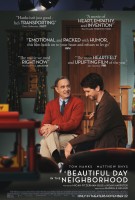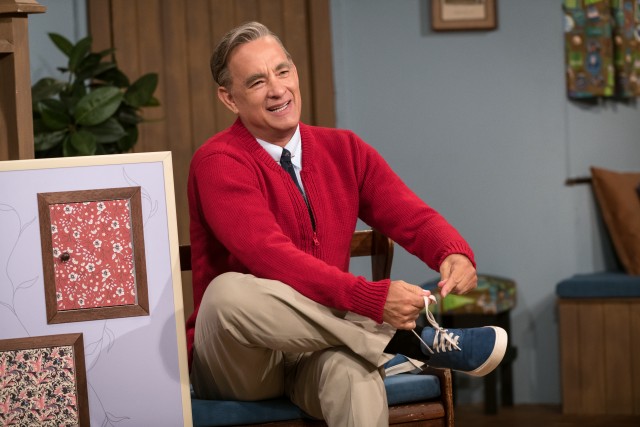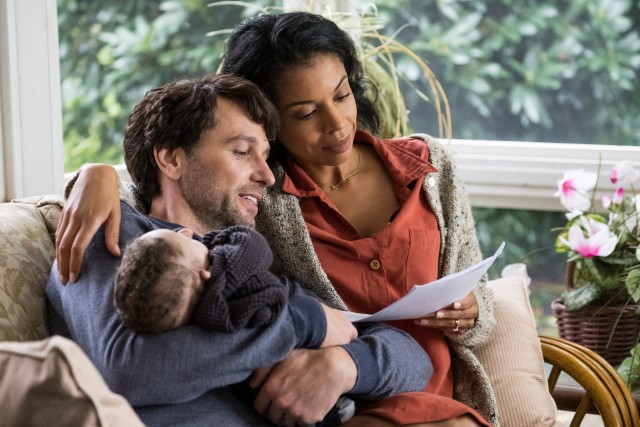A Beautiful Day in the Neighborhood Movie Review
 |
A Beautiful Day in the Neighborhood
Theatrical Release: November 22, 2019 / Running Time: 109 Minutes / Rating: PG-13 Director: Marielle Heller / Writers: Micah Fitzerman-Blue, Noah Harpster (screenplay); Tom Junod (article "Can You Say...Hero?") Cast: Tom Hanks (Fred Rogers), Matthew Rhys (Lloyd Vogel), Susan Kelechi Watson (Andrea Vogel), Chris Cooper (Jerry Vogel), Christine Lahti (Ellen), Maryann Plunkett (Joanne Rogers), Enrico Colantoni (Bill Isler), Jessica Hecht (Lila Vogel), Wendy Makkena (Dorothy), Carmen Cusack (Margy), Noah Harpster (Todd), Tammy Blanchard (Lorraine), Maddie Corman (Lady Aberlin), Daniel Krell (Mr. McFeely), Kelley Davis (First AD) |
Few documentaries have had the impact of Won't You Be My Neighbor?. Morgan Neville's 2018 unanimously acclaimed film turned Mr. Rogers, a longtime children's television personality who had died fifteen years earlier, A Beautiful Day in the Neighborhood is no biopic, which is probably for the best. Instead, it draws its inspiration from a 1998 Esquire profile conducted by Tom Junod. Assigned to write 400-word article on Rogers for the magazine's issue dedicated to heroes, Junod's encounters with Rogers developed into a 10,000-word cover story and a full-blown friendship. That part is true and rather intriguing and inspiring.
Less intriguing, inspiring, and true is the story of Lloyd Vogel (Matthew Rhys), the film's reimagining of Junod. Like the real Junod, Vogel has earned a bit of a bad reputation, notorious from his ability to craft unflattering portraits of various interview subjects. Rogers (Tom Hanks) is the only celebrity approached by the magazine who agrees to chat with Vogel.
And so, the New York-based reporter, who is also a husband of eight years and a father to a newborn, journeys to Pittsburgh's WQED station to catch the hardworking, kind-hearted Rogers on a rare break from his show of monologues and make believe. Expecting an hour, Vogel doesn't even get twenty minutes with Rogers before returning home. But he soon gets a phone call from the host and the two plan to reconnect when Rogers is visiting New York.
Rogers is no easy interview for Vogel. Repeatedly, the cardigan-wearing, mild-mannered Presbyterian minister turns things around and has questions for Vogel, about his childhood dolls and the cut on his nose (from punches thrown by Vogel's wayward father at Vogel's sister's wedding).
Recognizing that Rogers is too saintly, pure, and free of detectable conflict to pin the whole movie on him, screenwriters Micah Fiztzerman-Blue and Noah Harpster (Amazon's "Transparent" and Maleficent: Mistress of Evil) make the decision to place Vogel and his family woes at the heart of the film. It's an understandable tactic, but not a terribly agreeable one as the film slows to a crawl every time Mr. Rogers goes offscreen, which is plenty.
There's nothing particularly interesting in Vogel and his wife's (Susan Kelechi Watson) foray into parenting. The father-son conflict assigns substantial screentime to Chris Cooper, which seems easy to get behind, What saves the film from mediocrity and elevates it to a pleasing quality is Mr. Rogers, whose frank manner of addressing and comforting children is the same he uses to address and comfort adults, especially the consolable Vogel.
The supposedly unlikely friendship captivates, even with director Marielle Heller choosing to mine the format and stylings of the signature series "Mr. Rogers' Neighborhood" as a way to repair the broken largely fictionalized journalist. It's a way to generate the warm feelings we get from watching old episodes of the show, a fixture of public broadcasting. But it comes across as more than a little hokey and mildly exploitative too.
Heller displayed fine directorial instincts on last year's Can You Ever Forgive Me?, a far more factual story of a literary forger and her second time in the director's chair. Here, she captures some strong emotional stuff, but the flourishes are a bit unneccessary and the inventions of the screenplay do ring false. Again, though, it is the sheer good nature of Rogers that shines through and gives the film wings.
The power doesn't even come from Hanks' performance of Rogers, which is fine but no more convincing than his Walt Disney in Saving Mr. Banks. Hanks is a great actor, but not because of his range. Other actors would have tried to transform themselves physically and vocally to more closely resemble the distinctive Rogers. Such chameleons would disappear in the role and wow you in the process, but they would lack something that only Hanks can supply here, the appropriate avuncular charm as someone multiple generations have grown up watching and loving. He's little older and grayer than we're used to seeing him, but we still see Hanks, and yet there is magic in the casting.
But the main magic of the movie is that of Rogers, whose messages and manners not only endure but somehow grow even more powerful with the passage of time. We can never return to our childhoods and experience life with the same naivete, purity, and insecurities we carried in those "simpler times." But trotting out the old lessons and expressions of Mr. Rogers and recreating the sets, puppets, and look of his show gets us closer to our younger selves and states of mind and there is genuine value unearthed in such an endeavor here.
|
Related Reviews:
DVDizzy.com | DVD and Blu-ray Reviews | New and Upcoming DVD & Blu-ray Schedule | Upcoming Cover Art | Search This Site
DVDizzy.com Top Stories:
Now in Theaters: Marriage Story • The Irishman • Frozen II • Harriet • Maleficent: Mistress of Evil
Won't You Be My Neighbor?
Tom Hanks: Sully • Saving Mr. Banks • Captain Phillips • A Hologram for the King • The Post
Matthew Rhys: Brothers and Sisters: The Complete First Season
Directed by Marielle Heller: Can You Ever Forgive Me? • Diary of a Teenage Girl
Text copyright 2019 DVDizzy.com. Images copyright 2019 Sony, TriStar Pictures, Tencent Pictures, and Big Beach Productions.
Unauthorized reproduction prohibited.

